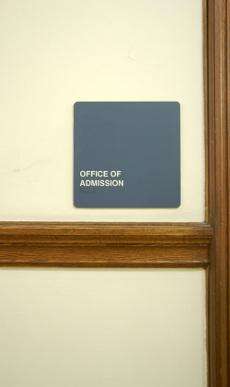Numbers like 4.0 and 800 are music to a college applicant's ears, but do they really impress the admissions committee?
GPA and SAT scores matter, say admissions counselors, but increasingly, it's the witty college essay or the inventive YouTube portfolio that scores an applicant a spot in the next entering class. Some colleges have moved to make standardized testing optional, preferring the qualitative materials that help a student stand out as an individual. After all, an 800 says you test well; a witty essay gives the committee a glimpse into who you are and how you think.
In search of the ideal applicant
The ideal college applicant may be a scholar, athlete, class president, violin virtuoso or chess champion--but not all of the above, say college admissions counselors. In fact, admissions staff are seeking a diverse set of individuals who can come together to form a vibrant community. Jacques Steinberg, author of "The Gatekeepers: Inside the Admissions Process of a Selective College," observes that "top" for an admissions counselor may mean the valedictorian, the high-scoring black or Hispanic applicant or the student who plays the bassoon.
What's important is communicating a clear interest and demonstrating leadership in that area, explains Steve Cohen, author of the bestselling college application guide "Getting In! The Zinch Guide to College Admissions and Financial Aid."
"Good colleges are not looking for the well rounded kid--they're looking for the well-rounded class," Cohen explains. "The ideal applicant is a kid with passion who has achieved some sort of leadership position in their chosen endeavor."
The admissions committee wants to know what excites and motivates you to do your best, according to John Chopka of Messiah College, VP of enrollment management.
"The admissions committee is looking for immeasurable qualities that set a student apart. What passions and experiences have shaped academic ambitions? What might the student bring to the college community that is unique or distinct?" he says.
The ideal college student is intellectually curious and adventurous--a promising apprentice, not yet a master. "The factor students most often forget is that we are evaluating them as a prospective learner, someone with needs and uncertainties, rather than someone who is already perfected," Jonathan Burdick, dean of admissions and financial aid at the University of Rochester, explains. Herculean efforts to perfect test scores can backfire; by contrast, sharing vulnerabilities can curry favor with counselors looking for authenticity and strong learning potential.
Features of a successful candidate
If numbers aren't a sure path into the entering class, what do admissions staff look for? "Character" tops the list of admissions criteria. Out of eight admissions directors consulted, all cited personal characteristics as predictors of success in college:
- Authenticity. "Original and independent perspective"; "Growth and learning over time"
- Boldness and an adventurous spirit. "Open to new experiences"; "Pushing to and coping with failure"
- Creativity.
- Leadership.
- Passion. "Showing an obvious passion for either the profession they want to study or the university itself "
- Social responsibility and empathy. "Do they volunteer for a cause? Have any special interests they've given their time to?"
Applicants with these characteristics demonstrate the maturity and resourcefulness that tells admissions counselors they'll make the most of the college experience.
Advice for applicants: Keep it real
Your job as an applicant is to communicate your unique qualities--your hook, as Steve Cohen puts it. Colleges are making it easier and easier to introduce yourself to the committee. Expect to find these "Get to Know You" options in your college application:
1. Personal statement: University of Pennsylvania popularized the psyche-revealing personal essay question in the late 1980s, asking: "You have just completed your 300-page autobiography. Please submit Page 217." Since then, college admissions committees have attempted to provoke creativity and/or candid self-revelation with ever-quirkier writing prompts. For example, University of Chicago's 2011-2012 application asks: "What does Play-Doh™ have to do with Plato?" (There is no right answer) while another prompt invites students to describe their "non-scientific method" using diagrams, graphs and/or visual aids. Rice University simply asks applicants to submit a picture (any picture) they like.
Admissions counselors have several motives in asking for a personal essay. Irreverent questions reveal creativity, adventurousness and the applicant's unique cast of mind--plus, an off-the-wall question is less likely to produce a plagiarized or canned response. In a New York Times article, MIT dean of admissions Marilee Jones observes that quirky essays are a way to loosen applicants up and get them to write essays that are a little less safe and more inspired.
2. Interview: Many admissions counselors place confidence in the good old-fashioned interview. Bard College invites students to visit campus, participate in a faculty seminar and meet with an admissions counselor. If you take them up on the offer, you can expect an admission decision the next day.
3. Creative portfolio: Many four-year universities request a multimedia record of your artistic accomplishments. Saint Leo University's admissions staff may review resumes, YouTube videos, DVDs or slideshows of athletic or artistic talents; PowerPoint presentations of personal backgrounds or interests; and even music or poetry students compose, says associate VP of enrollment, Scott Rhodes. The virtual talent show is an opportunity for students to highlight special skills and accomplishments.
Standardized testing and GPA numbers have their place in the admissions process as a basic benchmark. But when it comes time to sift through qualified applicants and choose the next entering class, admissions counselors have to make hard choices. A clear hook helps you stand out from the pack and, if the fit is right, land in the committee's "admit" pile.
